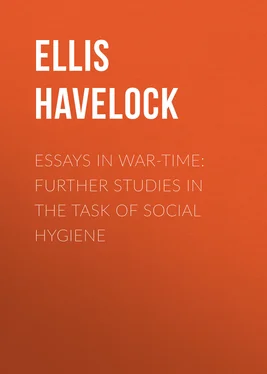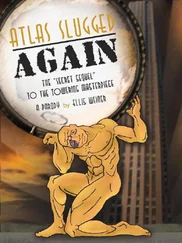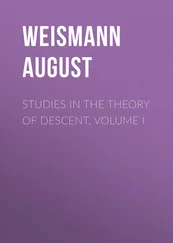Havelock Ellis - Essays in War-Time - Further Studies in the Task of Social Hygiene
Здесь есть возможность читать онлайн «Havelock Ellis - Essays in War-Time - Further Studies in the Task of Social Hygiene» — ознакомительный отрывок электронной книги совершенно бесплатно, а после прочтения отрывка купить полную версию. В некоторых случаях можно слушать аудио, скачать через торрент в формате fb2 и присутствует краткое содержание. Жанр: psy_sex_and_family, foreign_psychology, foreign_edu, на английском языке. Описание произведения, (предисловие) а так же отзывы посетителей доступны на портале библиотеки ЛибКат.
- Название:Essays in War-Time: Further Studies in the Task of Social Hygiene
- Автор:
- Жанр:
- Год:неизвестен
- ISBN:нет данных
- Рейтинг книги:5 / 5. Голосов: 1
-
Избранное:Добавить в избранное
- Отзывы:
-
Ваша оценка:
- 100
- 1
- 2
- 3
- 4
- 5
Essays in War-Time: Further Studies in the Task of Social Hygiene: краткое содержание, описание и аннотация
Предлагаем к чтению аннотацию, описание, краткое содержание или предисловие (зависит от того, что написал сам автор книги «Essays in War-Time: Further Studies in the Task of Social Hygiene»). Если вы не нашли необходимую информацию о книге — напишите в комментариях, мы постараемся отыскать её.
Essays in War-Time: Further Studies in the Task of Social Hygiene — читать онлайн ознакомительный отрывок
Ниже представлен текст книги, разбитый по страницам. Система сохранения места последней прочитанной страницы, позволяет с удобством читать онлайн бесплатно книгу «Essays in War-Time: Further Studies in the Task of Social Hygiene», без необходимости каждый раз заново искать на чём Вы остановились. Поставьте закладку, и сможете в любой момент перейти на страницу, на которой закончили чтение.
Интервал:
Закладка:
We may pass on to the second claim for war: that it is an essential factor in the social development of primitive human races. War has no part, though competition has a very large part, in what we call "Nature." But, when we come to primitive man the conditions are somewhat changed; men, unlike the lower animals, are able to form large communities—"tribes," as we call them—with common interests, and two primitive tribes can come into a competition which is acute to the point of warfare because being of the same, and not of two different, species, the conditions of life which they both demand are identical; they are impelled to fight for the possession of these conditions as animals of different species are not impelled to fight. We are often told that animals are more "moral" than human beings, and it is largely to the fact that, except under the immediate stress of hunger, they are better able to live in peace with each other, that the greater morality of animals is due. Yet, we have to recognise, this mischievous tendency to warfare, so often (though by no means always, and in the earliest stages probably never) found in primitive man, was bound up with his superior and progressive qualities. His intelligence, his quickness of sense, his muscular skill, his courage and endurance, his aptitude for discipline and for organisation—all of them qualities on which civilisation is based—were fostered by warfare. With warfare in primitive life was closely associated the still more fundamental art, older than humanity, of dancing. The dance was the training school for all the activities which man developed in a supreme degree—for love, for religion, for art, for organised labour—and in primitive days dancing was the chief military school, a perpetual exercise in mimic warfare during times of peace, and in times of war the most powerful stimulus to military prowess by the excitement it aroused. Not only was war a formative and developmental social force of the first importance among early men, but it was comparatively free from the disadvantages which warfare later on developed; the hardness of their life and the obtuseness of their sensibility reduced to a minimum the bad results of wounds and shocks, while their warfare, being free from the awful devices due to the devilry of modern man, was comparatively innocuous; even if very destructive, its destruction was necessarily limited by the fact that those accumulated treasures of the past which largely make civilisation had not come into existence. We may admire the beautiful humanity, the finely developed social organisation, and the skill in the arts attained by such people as the Eskimo tribes, which know nothing of war, but we must also recognise that warfare among primitive peoples has often been a progressive and developmental force of the first importance, creating virtues apt for use in quite other than military spheres. 3 3 On the advantages of war in primitive society, see W. MacDougal's Social Psychology , Ch. XI.
The case is altered when we turn from savagery to civilisation. The new and more complex social order while, on the one hand, it presents substitutes for war in so far as war is a source of virtues, on the other hand, renders war a much more dangerous performance both to the individual and to the community, becoming indeed, progressively more dangerous to both, until it reaches such a climax of world-wide injury as we witness to-day. The claim made in primitive societies that warfare is necessary to the maintenance of virility and courage, a claim so fully admitted that only the youth furnished with trophies of heads or scalps can hope to become an accepted lover, is out of date in civilisation. For under civilised conditions there are hundreds of avocations which furnish exactly the same conditions as warfare for the cultivation of all the manly virtues of enterprise and courage and endurance, physical or moral. Not only are these new avocations equally potent for the cultivation of virility, but far more useful for the social ends of civilisation. For these ends warfare is altogether less adapted than it is for the social ends of savagery. It is much less congenial to the tastes and aptitudes of the individual, while at the same time it is incomparably more injurious to Society. In savagery little is risked by war, for the precious heirlooms of humanity have not yet been created, and war can destroy nothing which cannot easily be remade by the people who first made it. But civilisation possesses—and in that possession, indeed, civilisation largely consists—the precious traditions of past ages that can never live again, embodied in part in exquisite productions of varied beauty which are a continual joy and inspiration to mankind, and in part in slowly evolved habits and laws of social amenity, and reasonable freedom, and mutual independence, which under civilised conditions war, whether between nations or between classes, tends to destroy, and in so destroying to inflict a permanent loss in the material heirlooms of Mankind and a serious injury to the spiritual traditions of civilisation.
It is possible to go further and to declare that warfare is in contradiction with the whole of the influences which build up and organise civilisation. A tribe is a small but very closely knit unity, so closely knit that the individual is entirely subordinated to the whole and has little independence of action or even of thought. The tendency of civilisation is to create webs of social organisation which grow ever larger, but at the same time looser, so that the individual gains a continually growing freedom and independence. The tribe becomes merged in the nation, and beyond even this great unit, bonds of international relationship are progressively formed. War, which at first favoured this movement, becomes an ever greater impediment to its ultimate progress. This is recognised at the threshold of civilisation, and the large community, or nation, abolishes warfare between the units of which it is composed by the device of establishing law courts to dispense impartial justice. As soon as civilised society realised that it was necessary to forbid two persons to settle their disputes by individual fighting, or by initiating blood-feuds, or by arming friends and followers, setting up courts of justice for the peaceable settlement of disputes, the death-blow of all war was struck. For all the arguments that proved strong enough to condemn war between two individuals are infinitely stronger to condemn war between the populations of two-thirds of the earth. But, while it was a comparatively easy task for a State to abolish war and impose peace within its own boundaries—and nearly all over Europe the process was begun and for the most part ended centuries ago—it is a vastly more difficult task to abolish war and impose peace between powerful States. Yet at the point at which we stand to-day civilisation can make no further progress until this is done. Solitary thinkers, like the Abbé de Saint-Pierre, and even great practical statesmen like Sully and Penn, have from time to time realised this fact during the past four centuries, and attempted to convert it into actuality. But it cannot be done until the great democracies are won over to a conviction of its inevitable necessity. We need an international organisation of law courts which shall dispense justice as between nation and nation in the same way as the existing law courts of all civilised countries now dispense justice as between man and man; and we further need, behind this international organisation of justice, an international organisation of police strong enough to carry out the decisions of these courts, not to exercise tyranny but to ensure to every nation, even the smallest, that measure of reasonable freedom and security to go about its own business which every civilised nation now, in some small degree at all events, already ensures to the humblest of its individual citizens. The task may take centuries to complete, but there is no more urgent task before mankind to-day. 4 4 It is doubtless a task beset by difficulties, some of which are set forth, in no hostile spirit, by Lord Cromer, "Thinking Internationally," Nineteenth Century , July, 1916; but the statement of most of these difficulties is enough to suggest the solution.
Интервал:
Закладка:
Похожие книги на «Essays in War-Time: Further Studies in the Task of Social Hygiene»
Представляем Вашему вниманию похожие книги на «Essays in War-Time: Further Studies in the Task of Social Hygiene» списком для выбора. Мы отобрали схожую по названию и смыслу литературу в надежде предоставить читателям больше вариантов отыскать новые, интересные, ещё непрочитанные произведения.
Обсуждение, отзывы о книге «Essays in War-Time: Further Studies in the Task of Social Hygiene» и просто собственные мнения читателей. Оставьте ваши комментарии, напишите, что Вы думаете о произведении, его смысле или главных героях. Укажите что конкретно понравилось, а что нет, и почему Вы так считаете.












